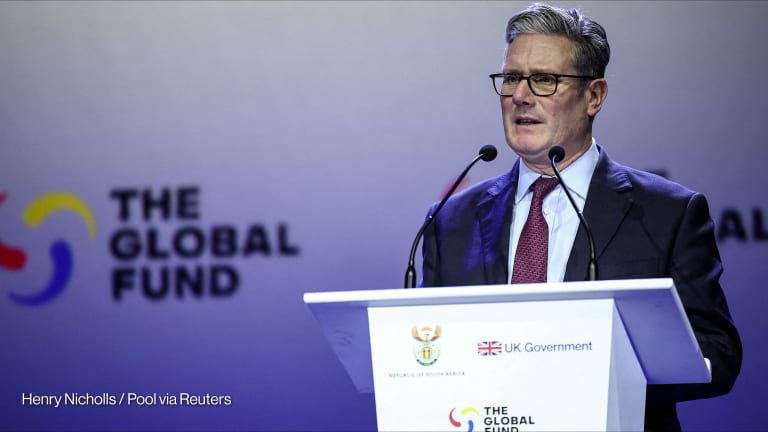
The United Kingdom government pledged nothing during the latest replenishment event of the Global Fund to Fight AIDS, Tuberculosis and Malaria on Wednesday, shocking many global health campaigners.
It is the first time the U.K., which is usually a top donor to the fund, has not made a pledge at a replenishment session of the major health financing facility it helped establish in 2002 — having previously increased its pledges each funding cycle. The U.K. last pledged $1.7 billion in 2020, of which $1.4 billion was delivered.
The U.K. has until October to make a pledge, and any amount that is announced will be seen by experts as a key indicator of the U.K.’s position as a leading player in international development — a reputation that has already suffered as a result of its aid cuts. Other major economies, including the United States, Germany, and Spain, increased their Global Fund pledges by around 30% at the replenishment session on Wednesday in New York City, timed with the 77th United Nations General Assembly.
“Kind words are not enough … the UK must not step back from showing global solidarity in the fight against deadly infectious diseases.”
— Aaron Oxley, executive director, Results UK“We will be announcing our pledge in the coming weeks, we will work with the Global Fund to fight for what counts,” said Vicky Ford, international development minister at the Foreign, Commonwealth & Development Office, in her first major announcement since taking the role.
Speaking during the replenishment conference, Ford outlined the U.K.’s historic contributions, around $5 billion, to the fund and the government’s other work on global health, such as funding Gavi and UNITAID.
This is the seventh replenishment of the body, which is seeking $18 billion from donor countries to finance its work over the next three years. More than 90% of the funding comes from donor governments, and the vast majority of pledges come on or before the day of the replenishment event.
Meanwhile, low-income countries entitled to receive U.K. aid did make pledges, with Uganda promising $3 million and Malawi $1 million, both 50% increases, according to their governments. Kenya, which like the U.K. has recently experienced a change of government, pledged $10 million, up 40% from its previous pledge.
“I’ve worked on five Global Fund replenishment conferences, and this is the first one where the UK has left without showing its support financially,” said Aaron Oxley, executive director at Results UK, a global health campaign organization.
He added: “Kind words are not enough: at a time when so many of our allies have stepped up and significantly increased their pledges, the UK must not step back from showing global solidarity in the fight against deadly infectious diseases.”
The U.K.’s decision put the government on course to “squander a British scientific breakthrough on a new malaria vaccine and further diminish the UK’s reputation on the world stage,” according to Preet Gill, shadow international development secretary with the U.K.’s opposition Labour party.
The U.K.’s government has been in stasis since the resignation of former Prime Minister Boris Johnson in July, putting major decisions on hold — including on “non essential” aid spending — until Liz Truss won her campaign to become prime minister in September. Since then, the Queen has died, disrupting government business, and the U.K. Treasury is gearing up for a significant domestic financial intervention on Friday, causing continued uncertainty around the aid budget.
Soaring Home Office refugee costs — funded by aid — are believed to have eaten into the U.K.’s reduced development budget of 0.5% of national income by as much as £3 billion. The government has not confirmed by how much Home Office refugee costs have eaten into the aid budget, or what international programs will be affected as a result.
Earlier this month, a group of more than 100 Ukrainian civil society organizations wrote a letter to Prime Minister Liz Truss asking her to increase the U.K.’s Global Fund donation by 30%.
“Even before the war, Ukraine had a high HIV and TB disease burden, but our country had also made remarkable achievements in combatting HIV and TB with the help of partners like the Global Fund,” they wrote.
The letter continued: “We are also standing in solidarity with communities in other parts of the world that are sharing our struggle… This is a time when we need supporting countries to uphold their global investments. We therefore hope that you will strongly support the upcoming Seventh Replenishment.”









